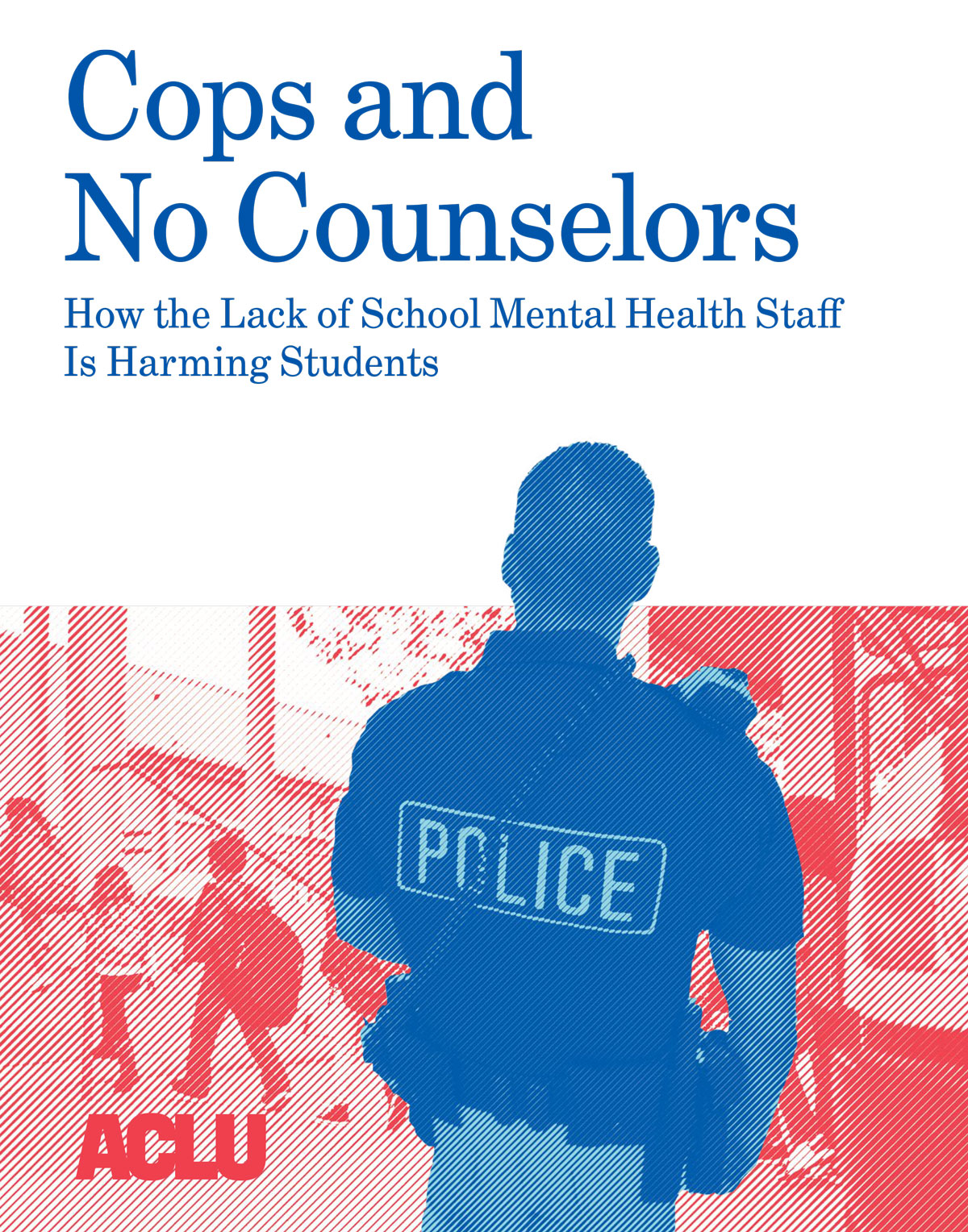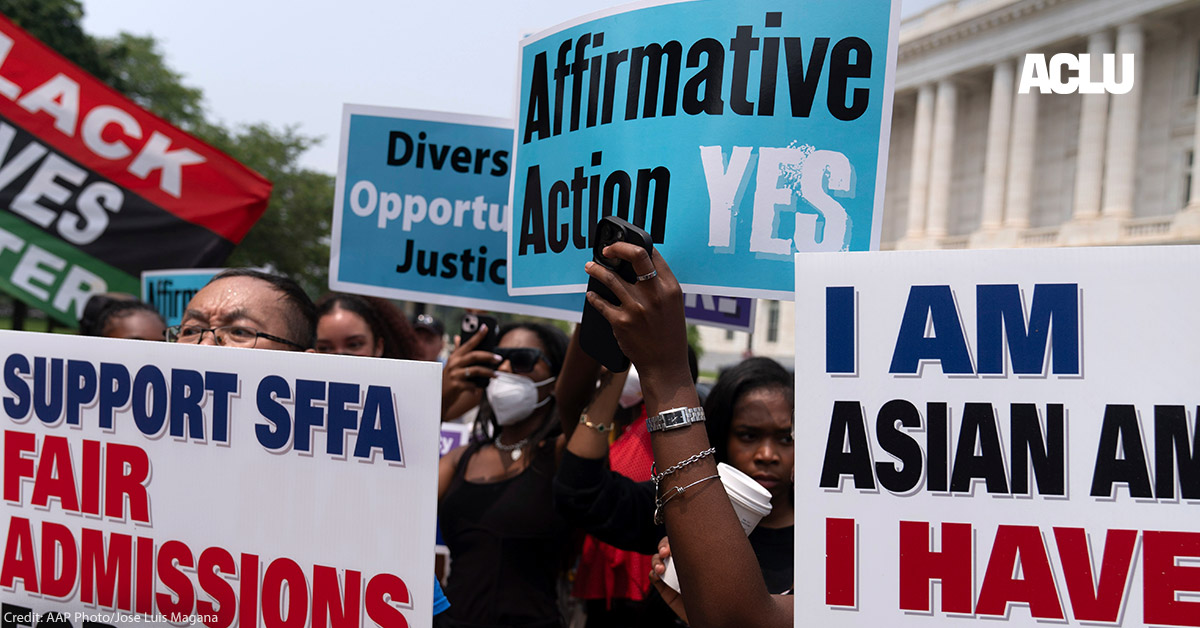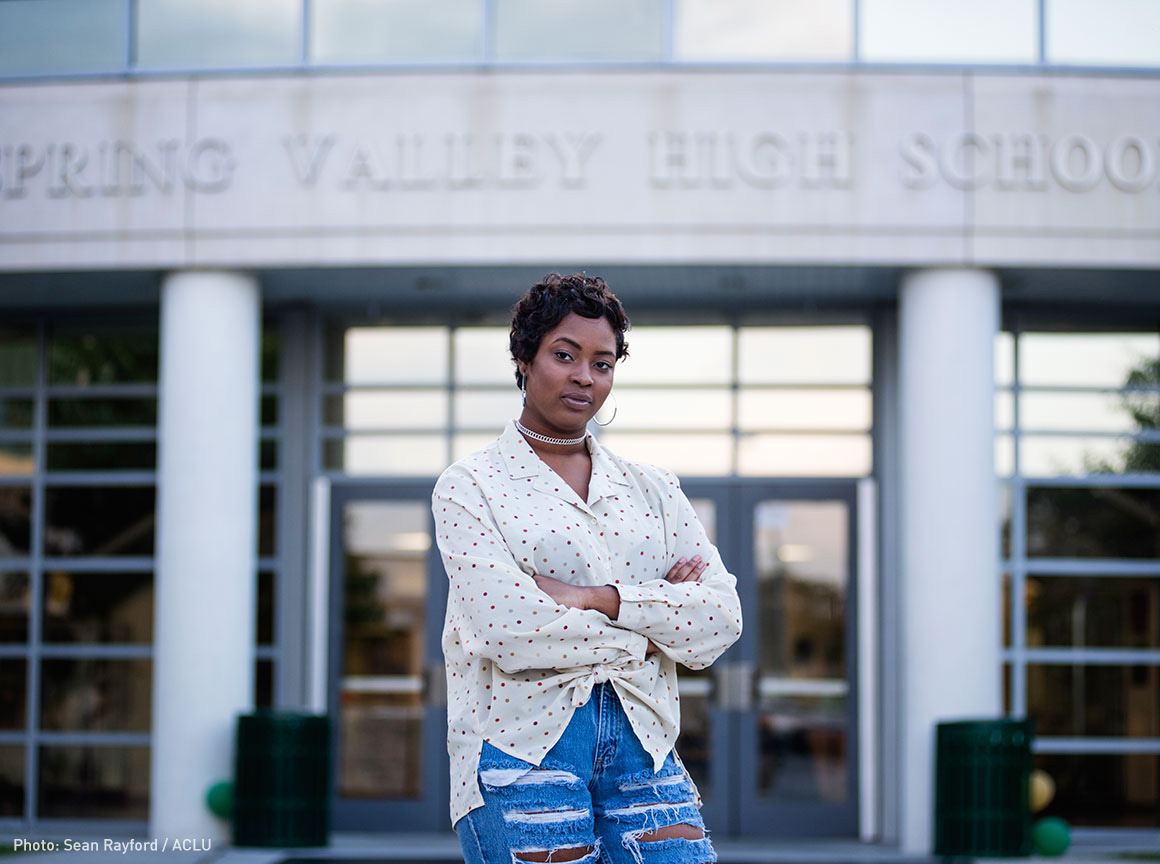All students have a right to an equal education, but students of color — particularly Black and Brown students and students with disabilities, have historically been marginalized and criminalized by the public school system. The ACLU has been working to challenge unconstitutional disciplinary policies in schools, combat classroom censorship efforts that disproportionately impact marginalized students, and support race conscious admission policies to increase access to higher education.
Let’s break down why education equity is critical to the fight for systemic equality.
What does “education equity” mean, and why is it a civil rights issue?
Education equity means all students have equal access to a high quality education, safe learning environment, and a diverse student body that enriches the educational experiences of all students.
As the Supreme Court said in Brown v. Board of Education, education “is the very foundation of good citizenship.” Through education, young people learn important values about our culture and democratic society, and about their own values and relationships to others in this society. In addition to being an important foundation for kids’ and young adults’ future professional success, education allows individuals to be informed voters and participants in democratic processes, and public education is the first experience most people will have with the government.
For all of these reasons, equity in education is a critical foundation for a democratic society in which people of all backgrounds are equally included. Without equal opportunities to obtain an education, they will not be able to participate equally in jobs, in voting, and in other crucial areas of life. And when students are not able to learn together, this harms their ability to work together and live and engage with one another later in life.
What was the foundational Supreme Court case aimed at addressing discrimination in education nationwide?
Modern understandings of educational equity have their roots in Brown v. Board of Education, the 1954 landmark Supreme Court decision that ordered an end to school segregation and held racial segregation in education violates the Equal Protection Clause of the constitution. The ACLU played an important role in the Brown litigation, and has continued to fight for education equity on many fronts in the decades since.
What is the “school-to-prison pipeline”?
The school-to-prison pipeline refers to school discipline practices, such as suspensions and referrals to law enforcement, that funnel youth out of the classroom and into the juvenile and criminal legal systems.
This trend reflects our country’s prioritization of incarceration over education, and it’s made worse as resources for public schools are cut. From inadequate resources for counseling to an overreliance on school-based police officers to enforce harsh zero-tolerance policies, many students — overwhelmingly students of color and students with disabilities — are isolated, punished, and pushed out of our education system for typical childish behavior and behaviors associated with disabilities.
Even a single suspension or disciplinary infraction can have enormous consequences for a child’s education. As a student is pushed further down the school-to-prison pipeline, those consequences escalate quickly. In some jurisdictions, students who have been suspended or expelled have no right to an education at all. In others, they are sent to disciplinary alternative schools.Youth who become involved in the juvenile system are often denied procedural protections in the courts, and students pushed along the pipeline find themselves in juvenile detention facilities, many of which provide few, if any, educational services.
How are Black students, students of color, and students with disabilities disproportionately impacted by discrimination in education? What barriers to higher education exist for students of color?
Black and Brown students and students with disabilities are disproportionately subjected to discipline and referrals to law enforcement that remove them from the classroom and subject them to additional punitive consequences and even physical injury. For example, over the 2017-2018 school year, Black students accounted for 28.7 percent of all students referred to law enforcement and 31.6 percent of all students arrested at school or during a school-related activity — despite representing just 15.1 percent of the total enrolled student population.
Our country’s schools are increasingly diverse, but also increasingly segregated. Students of all races are harmed by the inability to learn with one another in diverse school settings. Black and Latine students are also more likely to attend schools that are intensely segregated both by race and by socioeconomic status. Students of color are also less likely to have access to advanced courses, and are frequently tracked away from college preparatory courses when they do exist.
Inequities in K-12 education can be replicated in college and university admissions criteria. As with elementary and secondary schools, colleges and universities are required to ensure that educational opportunities are open to all students from the application stage and through student’s experiences during their college education. There are a wide range of things that colleges and universities can do to ensure that educational opportunities are open to people of all backgrounds.
What non-punitive responses should schools take when approaching school discipline issues? What non-punitive resources should schools invest in?
There are a range of evidence-based methods schools can use to respond to the behavioral needs of students. These range from strategies that teachers and schools can use to foster a positive learning culture and model, to interventions addressing particular disciplinary issues, such as conflict de-escalation or restorative justice, to using functional behavioral assessments and wraparound support for those students with higher levels of need.
Additionally, schools that employed more mental health providers saw improved student engagement and graduation rates. Schools that used other types of support, including restorative and trauma-informed practices, saw beneficial results, including reduced disciplinary incidents, suspensions, dropouts, and expulsions. Investing in mental health resources, support personnel, and interventions that promote positive student interactions can make schools safer and healthier learning environments, while also helping to combat the discriminatory school-to-prison pipeline that targets students of color and students with disabilities.
How do classroom censorship efforts (i.e. laws that block students and teachers from talking and learning about race and gender) lead to inequality in education?
Instruction about racism and sexism belongs in schools because it equips students to process the world around them and to live in a multicultural society.
Attacks on education have morphed from demands to exclude critical race theory from classrooms to ever-increasingly devious and dangerous demands to erase entire concepts from American history. Book bans, so-called transparency laws designed to intimidate educators into compliance, and attacks on individual expression have left our education system at the mercy of a hostile and discriminatory minority. Students can’t learn in that type of environment. Our future depends on educational institutions that value instruction about systemic racism and sexism. We need to expand culturally relevant instruction and increase funding for diversity, equity, and inclusion in schools, not attack it for its role in uplifting the systematically oppressed.
What can colleges do to ensure they create opportunities for students of color in light of the recent Supreme Court decision effectively eliminating the use of affirmative action in college admissions?
Affirmative action in college admissions has been an important tool, but it is not the only avenue for ensuring that educational opportunities are open to all. In the absence of affirmative action, it is more important than ever that schools work to identify and remove inequitable barriers to higher education. At a minimum, schools must continue to comply with federal and state civil rights laws that require them to provide educational opportunities on an equal basis. They can achieve this by ensuring that policies and practices do not unnecessarily limit opportunities for people on the basis of race or ethnicity (or other protected characteristics, including disability, sex, sexual orientation, and gender identity) and by ensuring that school climate enables all students to access and engage with educational opportunities.
What does the ACLU’s work in education equity look like today?
The ACLU and our affiliates around the country are challenging disciplinary policies that disparately target students of color and students with disabilities and infringe on their right to a safe learning environment. This includes litigation, such as our recent victory resulting in the end to charging students with “disorderly conduct” or “disturbing schools” in South Carolina schools, and advocacy, such as the ACLU of Idaho’s recent report Proud to be Brown and the related civil rights complaint. The report documents how school districts in Idaho are jeopardizing Latine students’ civil rights and liberties by enforcing “gang” dress codes that target mostly Latine students in a discriminatory way, and have negative consequences on their cultural identity, discipline, and education.
We are also fighting back against efforts to ban books and restrict what students can learn about race, gender, and sexual orientation. In Florida, for example, we’re challenging the state’s harmful Stop WOKE Act. We continue to press for equity in higher education following the Supreme Court’s ruling on affirmative action, and defend against attacks on diversity in K-12 schools.
From K-12 to higher education, the ACLU is working to combat discrimination in education and ensure all people have equal access to safe, quality education.
Date
Wednesday, September 6, 2023 - 10:45amFeatured image











